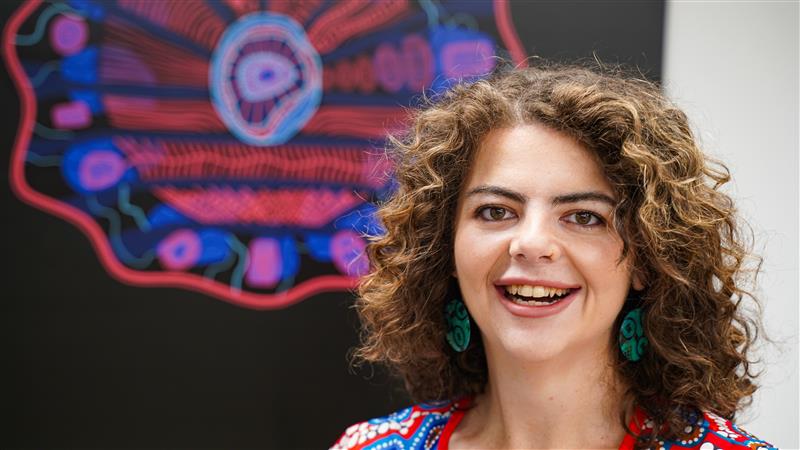
This NAIDOC Week, we are proud to introduce you to Karla Hume, DT Global's First Nations Lead, to learn more about the importance of NAIDOC Week and our #reconciliation achievements so far.
1. Can you tell us a little bit about yourself?
Sure! I’m an enthusiastic inclusion advocate with a deep passion for creating spaces where everyone feels seen, heard, and valued. I bring a unique combination of lived experience as a proud Truwulway/Trawlwoolway woman and as someone living with both apparent and non-apparent disabilities. These experiences shape everything I do, personally and professionally.
I’ve spent over 15 years working in Human Resources, with a strong focus on Talent, Culture, and Inclusion. I’ve had the privilege of working with some notable organisations, helping them build more inclusive and culturally safe environments, particularly for First Nations people and communities.
Outside of work, I’m a bit of a softie when it comes to animals. I have multiple rescue pets who themselves have disabilities, and I regularly open my home to foster furry friends in need. I’m also a proud Home Habitat partner, and I take great pride in my native, sustainable garden. It’s my little sanctuary and a reflection of my commitment to caring for Country in everyday ways.
At the heart of it all, I’m driven by a belief in the power of lived experience to shape better systems, stronger communities, and more compassionate leadership.
2. Why is NAIDOC Week so important to you?
For me, this year’s NAIDOC theme really hits home. As the eldest in my family, I often think about the legacy I’m leaving behind for my younger siblings, nieces, and nephews. I carry a deep sense of responsibility, not just because I’m the oldest, but because I had the privilege of spending time with many of our Elders when I was younger. They were the knowledge keepers, the storytellers, and the strength behind our community. Their wisdom and resilience shaped me, and now I see it as both my duty and my honour to carry their vision forward. Everything I do, whether it’s in my work, my advocacy, or how I show up in the community, is about creating a better, brighter, and more equitable future for the next generation. This theme reminds me that we are all part of a continuum, and it’s our turn to hold the line, to lead with strength, and to make sure the path ahead is one they can walk with pride.
3. Can you tell us about your work at DT Global and what you do?
At DT Global, I oversee First Nations affairs, which is a role I’m incredibly proud of. A big part of my work involves driving meaningful outcomes through our Reconciliation Action Plan, but it goes far beyond that. I work closely with our programs and partners across the Asia-Pacific region to ensure that we’re upholding the UN Declaration on the Rights of Indigenous Peoples in everything we do. This means I’m often engaged in deep, important conversations around self-determination, cultural safety, and how we can work more respectfully and effectively alongside not just First Nations communities here in Australia, but Indigenous communities throughout the region. It’s about embedding those values into the fabric of our operations, so that inclusion, respect, and equity aren’t just aspirations, but lived practices across all our work.
4. What work are you most proud of in the last 12 months?
Over the past year, one of my proudest achievements has been the successful execution and launch of our Innovate Reconciliation Action Plan. It was a significant undertaking, not just in terms of the work involved, but in ensuring the plan was meaningful, actionable, and capable of driving real, tangible change within our organisation and across our industry. I wanted it to be more than just a document; I wanted it to be a catalyst for progress.
Additionally, I’ve dedicated a significant amount of energy to strengthening our procurement and supply practices, particularly in relation to First Nations engagement. Through improved reporting and deeper relationships with First Nations suppliers, we’ve significantly increased our First Nations spend compared to previous years. That shift is something I’m incredibly proud of because it reflects a genuine commitment to economic empowerment and long-term impact.
5. What are you looking forward to in the future?
There’s so much happening in this space that excites me, but what I’m most looking forward to is deepening the understanding of Reconciliation within our organisation. It’s not just about awareness; it’s about embedding a shared responsibility and commitment to meaningful action across all levels of our work.
I’m also incredibly excited about the potential for more First Nations professionals and organisations to break into the international development and aid sectors. Right now, there are very few of us represented in these spaces, and I truly believe that increasing this representation will lead to better, more culturally informed outcomes for the communities we serve, especially in the diverse regions across the Asia-Pacific where we’re privileged to work.
A greater First Nations presence in international development isn’t just overdue; it’s essential, and I’m proud to be part of the movement helping to make that happen.
For more on NAIDOC Week: https://www.naidoc.org.au/about/naidoc-week